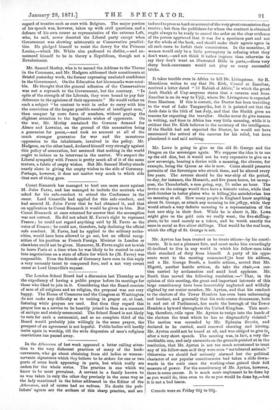Mr. Ayrton has been treated as he treats others—by his
consti- tuents. It is not a pleasant fate, and must make him exceedingly ill-inclined to live in any world in which his fellow-men take their standard of duty from himself. A party of his oppo- nents went to the meeting summonedy„to hear his address, and a Mr. George Booth, a hostile artisan, moved that Mr. Migotti, another hostile artisan, do take the chair,—a mo- tion carried by acclamation and amid loud applause. Mr. Booth then moved the following resolution :—" That, in the opinion of this meeting, the great and important interests of this large constituency have been lamentably neglected and wilfully slighted by our senior member, Mr. Ayrton, and that his conduct to the electors of the Tower Hamlets has even been unbecoming and insolent, and generally that his rude coarse demeanour, both in and out of Parliament, has made the borough of the Tower Hamlets a byword throughout the United Kingdom. This meet- ing, therefore, calls upon Mr. Ayrton to resign into the hands of the electors the trust which he has so disgracefully violated." The motion was seconded by Mr. Ephraim Brooks, and declared to be carried, amid renewed cheering and hissing. Mr. Ayrton could not be heard at all, and was obliged to give in, after a very short speech. The meeting was, in fact, a very dis- creditable one, and only excusable on the grounds pointed at in the resolution, that Mr. Ayrton is not too much accustomed to treat any of his fellow-men as if they were even " ver tebrated animals" Otherwise we should feel seriously alarmed lest the political character of our popular constituencies had taken a slide down- wards in the scale since the working-class gained their full measure of power. For the constituency of Mr. Ayrton, however, there is some excuse. It is much more unpleasant to be done by as you would do, than even to do as you would be done by,—but it is not a bad lesson.


































 Previous page
Previous page